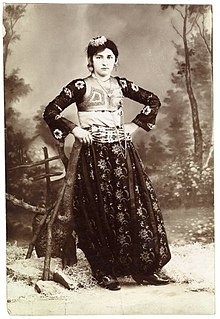 Albanian woman (late 19th century/early 20th century) | |
| General Statistics | |
|---|---|
| Maternal mortality (per 100,000) | 27 (2010) |
| Women in parliament | 35.4%[1] (2021) |
| Women over 25 with secondary education | 81.8% (2012) |
| Women in labour force | 52.0% (2014)[2] |
| Gender Inequality Index[3] | |
| Value | 0.144 (2021) |
| Rank | 39th out of 191 |
| Global Gender Gap Index[4] | |
| Value | 0.787 (2022) |
| Rank | 18th out of 146 |
| Part of a series on |
| Women in society |
|---|
 |
The first women's association in Albania was founded in 1909.[5] Albanian women from the northern Gheg region resided within a conservative[6] and patriarchal society. In such a traditional society, the women had subordinate roles in Gheg communities that believe in "male predominance". This is despite the arrival of democracy and the adoption of a free market economy in Albania, after the period under the communist Party of Labour.[7] Traditional Gheg Albanian culture was based on the 500-year-old Kanun of Lekë Dukagjini, a traditional Gheg code of conduct, where the main role of women was to take care of the children and to take care of the home.[6]
- ^ "Women in Parliaments: World Classification". www.ipu.org. Archived from the original on 28 March 2014. Retrieved 1 April 2018.
- ^ "Labor force participation rate, female (% of female population ages 15-64) (modeled ILO estimate) - Data - Table". World Bank. Archived from the original on 5 May 2016. Retrieved 17 June 2016.
- ^ "Human Development Report 2021/2022" (PDF). HUMAN DEVELOPMENT REPORTS. Retrieved 28 November 2022.
- ^ "Global Gender Gap Report 2022" (PDF). World Economic Forum. Retrieved 9 February 2023.
- ^ De Haan, Francisca; Daskalova, Krasimira; Loutfi, Anna (2006). Biographical Dictionary of Women's Movements and Feminisms in Central, Eastern, and South Eastern Europe: 19th and 20th Centuries. Central European University Press. p. 454. ISBN 978-963-7326-39-4 – via Google Books.
...founders (1909) of the first Albanian women's association, Yll'i mengjezit (Morning Star)
- ^ a b Bilefsky, Dan. "Albanian Custom Fades: Woman as Family Man". The New York Times. Archived from the original on 1 February 2013. Retrieved 27 October 2013.
- ^ Elsie, Robert. "Albania". Advameg, Inc. Archived from the original on 20 October 2013. Retrieved 27 October 2013.